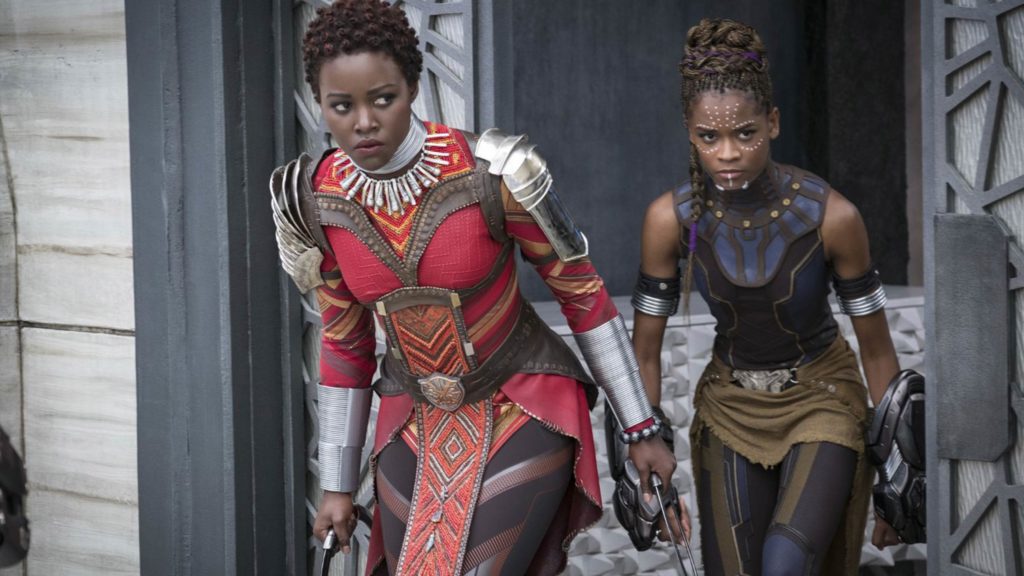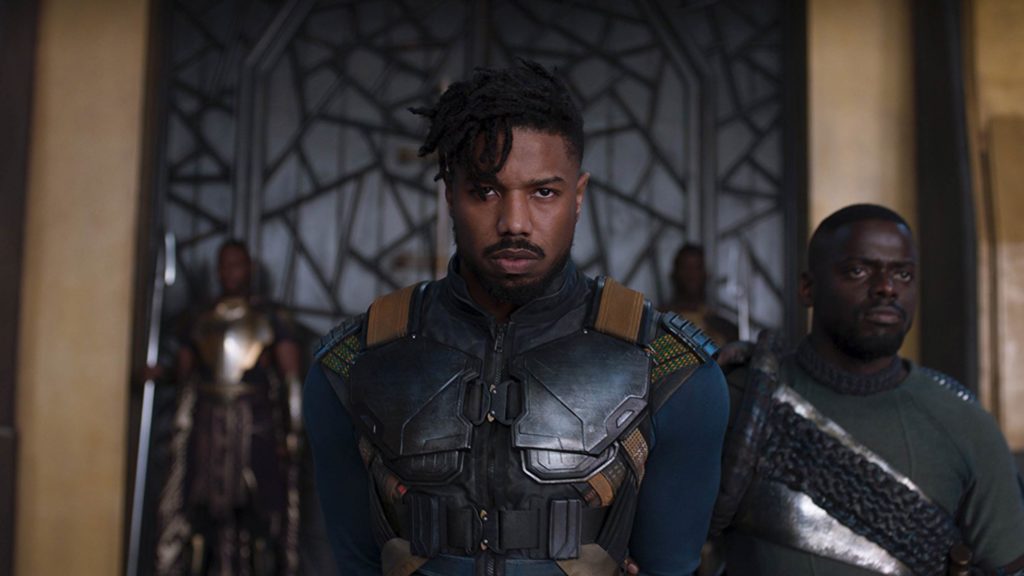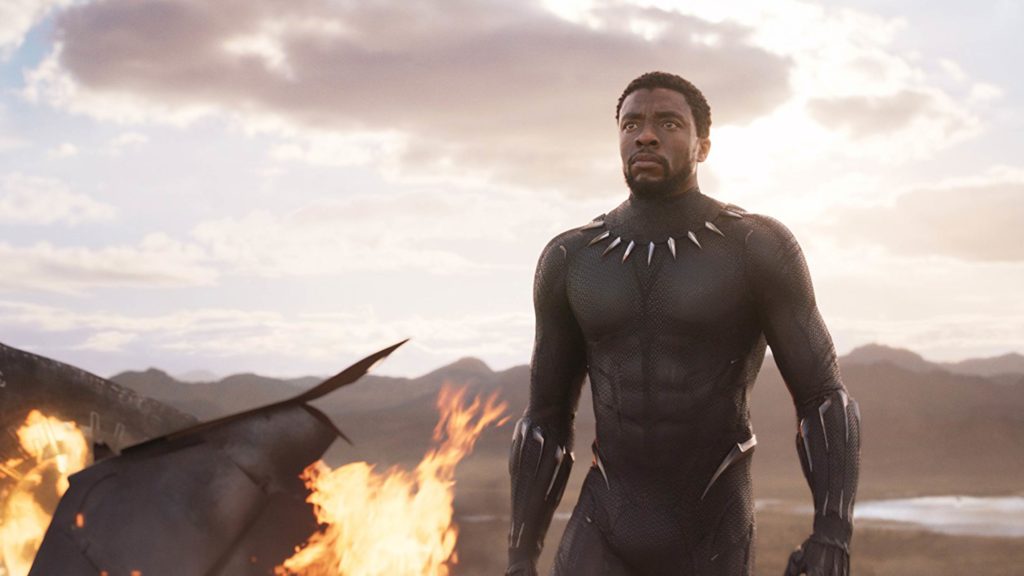Note: There are a BUNCH of spoilers in this here blog. Read at your own risk.
If you listen to The Brant Hansen Show then you know I (Sherri) am a HUGE Marvel Universe fan. HUGE. I’ve dabbled in DC Comics from time to time (I mean, Wonder Woman…hello???) but I always come back to Marvel. It’s been the favorite of my brother and me since childhood.
So to say I was ecstatic with the prospect of The Black Panther Movie would be an understatement. When they revealed The Black Panther Cave at the end of Captain America: Civil War I gasped. Those sitting around me in the theater may have called it a squeal, but I’m sticking with a high pitch gasp.
I was overwhelmed with joy that there would be superheroes on the screen that looked like me. Finally, I didn’t just have to be Storm. Finally, I would have other options for my delusions of superhero grandeur.
So on opening day I sat in the theater squealing – er, eh, gasping- during the incredible Dora Milaje fight scenes and briefly considered shaving my head.
I also may or may not have googled “broadcasting jobs in Wakanda” once or twice during the movie.
It was a thrill from beginning to end. Beyond the typical explosions and fight scenes inherent to all Marvel offerings, this script was transcendent. That’s not hyperbole. Friends and I are still unpacking so many truths that were buried in various phrases, cinematography choices, and relational tensions and struggles.
Specifically, for me, I was enraptured by the richness of character in this film.
Nakia: The Model of Understood Privilege

DISCLAIMER: I know the word ‘privilege’ is loaded with cultural and political innuendo. Just the mere use of the word may prompt you to grab a talking point or two to hurl around for your protection. Resist that urge, friend. Stay here in the magical Marvel Universe with us. Stay here.
Nakia is fiercely defending women and girls that have fallen prey to traffickers when we’re first introduced to her. She’s doing this alone, by the way, and once we see her fighting skills, we see she doesn’t need much help.
As the story unfolds, however, we see why she has chosen this path. It’s clear the king loves her. It’s clear at worst she could have a career fighting with the king’s guard: The Dora Milaje. At best she could be his queen. She rejected both for the sake of others.
She understands the privilege she has having grown up in Wakanda. It is an African nation of great wealth and prestige. Wakanda was never colonized. Just by being born there she has privilege that many women around the world that look like her do not have. She understands that.
She leverages her privilege for the protection of others even if it results in her demise. Not only that, she challenged her king and fellow countrymen to do the same.
Plus, and this has nothing to do with Nakia’s character specifically, but where can I buy those Vibranium Warrior Rings she had? I promise to use them only for good. I promise.
Killmonger: The Model of Resentment

I have to say Killmonger is a villain I had a tough time hating.
Yes, he was ruthless.
Yes, he was heartless.
Yes, the word “kill” is actually in his name.
But I got him. That’s so hard to say, but I did. On some levels, his words made sense to me. His motivation made sense to me. Many of his lines were things I may not have ever said aloud, but I’ve thought them. Alright, and I’ve said a few of them, too.
But it was his anger that terrified me. I had to ask if that same anger was residing in me waiting to explode. His resentment caused him to turn on his own family and his people. Sure, it’s all wrapped up in a righteous cause, but it’s still hostility, and it’s toxic not only to him but everyone around him.
When he does ascend to the throne, his anger makes him incapable of leading successfully. Why? Because nursed grievance is not a catalyst for change it’s a catalyst for shame and ultimate destruction. Anger is selfish, and it makes us selfish.
His last scene was breathtaking. His enemy has lovingly carried him to a mountain to see a land that is rightfully his. And his last line is:
“Bury me in the ocean with my ancestors who jumped from ships, cause they knew death was better than bondage.”
That line sounds noble, but it’s not.
Many plunged (or were thrown) to their death during the horror that was the Transatlantic Slave Trade. We know this and in many ways, continue to be affected by it.
But Killmonger is not in bondage. He’s royalty, and he’s now in the country of his royal heritage. Like Nakia, he’s in a position to help. But he won’t. The man on that cliff is in bondage only to his hate and bitterness. And when hate drives your heart, you’re oblivious to the actual reality that is right in front of you.
So he dies there; providing no legitimate help, action, or change to the for people who needed it. His anger has rendered him impotent. All he had was useless platitudes on a beautiful plateau.
So sad. And scary…because that surely could be me.
T’challa: The Model of Empathy

There were so many lessons that to be gleaned from this character. The one I keep going back to, however, is T’challa’s empathy for his enemy. Erik Killmonger sought to kill T’challa (his cousin) and thus ascend to the throne. T’challa, knowing this, still desired to know the origin of Killmonger’s rage. When he found that source and the part his family played in said source he did a few things that were mind-blowing:
- He argued in defense of his enemy. Putting himself in his place and asking others to do the same.
- He attempted restoration. Knowing WHY his enemy was doing what he was doing, he steered clear of the “get over it” or “pull yourself up by your bootstraps” reasoning. He attempted to validate his enemy’s experience and show him a path forward.
- After a fierce battle with his cousin/adversary, his last act of kindness was to physically carry him to the mountainside to show him the beauty of what could be his.
The beauty of T’challa was his willingness to see no person is ALL bad or ALL good.
We’re all a mixed bag of motives. It’s so easy to sit back and cast judgment on people and their choices when you’ve never taken a walk in their shoes. It’s equally simple to dismiss the pain as imaginary or exaggerated. Empathy is what the king chose. Sitting in someone’s pain and then trying to lead them out of it.
Alright.
There are many more symbols and metaphors throughout the movie. I can and have talked about it for hours.
I know it’s just a Marvel movie. They did the standard blowing up of buildings, spaceships, and well, people. But they blew up a lot more. They blew up stereotypes, misconceptions, and all-out fallacies. It was a Marvel triumph of epic proportions.
Photo Credit: IMDB
- Teachers, Do You Realize How Powerful You Are? - August 29, 2018
- Jesus, PMS, and Chocolate - July 16, 2018
- 3 Beautiful Truths I Learned from Characters in The Black Panther - April 26, 2018
